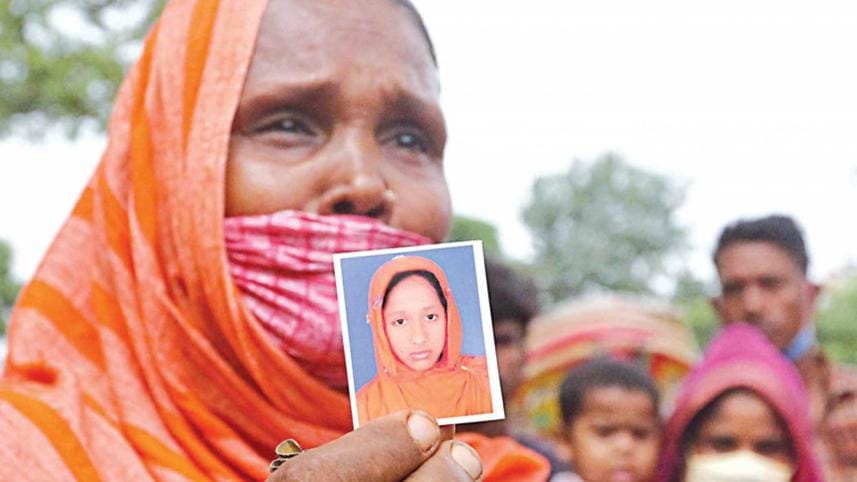Three months after the Hashem factory fire, has there been any ‘justice’?

Today, October 8, marks three months since the deadly Hashem Foods fire, which claimed the lives of at least 54 people. Out of those killed, at least 17 were children. Out of these 17 children, at least 11 were girls.
This deadly fire exposed the sheer prevalence of child labour in Bangladesh, which has seen a rise globally for the first time in two decades due to the school closures and economic hardships caused by the pandemic, according to a report by the ILO and UNICEF. Even before the pandemic, in the National Child Labour Survey 2013 (the latest such survey to have taken place in this country), 3.45 million children aged five to 17 were found to have been engaged in child labour.
The week starting October 4, 2021 has been declared as the National Child Rights Week, which will end on October 11—on which falls the International Day of the Girl Child. Therefore, this week, and this day in particular, is as good a time as any to ask: what has happened so far by way of "justice" in response to this deadly fire in which so many people, including girls, lost their lives?
On July 10, 2021, eight people, including the owner of Hashem Foods Factory, his four sons and three Sajeeb Group employees, were arrested in a case filed by the police under three sections of the Penal Code 1860: Section 302 (murder), Section 307 (attempt to murder) and Section 326 (voluntarily causing hurt to constrain to an illegal act). Since all these offences require intent to murder or cause hurt, it was bound to fail. If, however, a case was filed under Section 304a (causing death by negligence) of the Penal Code, the case would have had an actual chance to succeed. By July 19, most of those arrested were released on bail.
On July 11, four NGOs filed a writ petition against the relevant public authorities, challenging their failure to detect and shut down the death trap of a factory, and against the factory owners, seeking Tk 5 crore in compensation for each of the families of those killed, and Tk 1 crore for those injured. At the time, the single-judge virtual bench of the Supreme Court expressed that its jurisdiction was limited and that it was necessary for a list of the deceased and injured workers to be identified before any order of compensation could be made.
A Citizen's Investigation Committee comprising 19 eminent citizens was subsequently (but separately) set up, and a thorough investigation was conducted over 30 days. On August 31, it came to the conclusion that the fire was no "accident", but "murder caused by negligence". During the press briefing at the Dhaka Reporters Unity, the Committee's members read out from their report, categorically stating that: "The devastating incident took place due to indifference, negligence and greed of the owner. That's why we're not terming it an accident, but rather a systematic killing". The Committee's investigation also found that all families were given Tk 2 lakh in compensation from Sajeeb Group but that they had to sign a declaration, one of the terms of which reads as follows: "durghotonay nihoter ghotonay amader Hashem Foods Limited kortripokkher birudhey kono dabi oboshishto nai" (I have no further claims against Hashem Foods Limited in connection with the death in this accident).
One such recipient family member had earlier told reporters, "I didn't understand what was written on the stamp [paper] at that time. If I had known, I would never have signed it."
It is worth noting that Sajeeb Group was able to limit their liability to pay compensation to a measly sum of only Tk 2 lakh for each worker killed by the deadly fire in their factory precisely because that is how little value our own labour law attaches to the life of a worker killed in an industrial "accident". Such an absurd legal limit deprives the very workers (and their dependents) our labour law is meant to protect, while benefitting the very industrial employers our labour law is apparently supposed to hold accountable.
Nevertheless, forcing victims to make a blanket surrender of any further claims (with or without their knowledge) in exchange for Tk 2 lakh highlights the immense power disparity that continues to define industrial labour relations. It is an attempt to absolve the company from other claims that may arise out of labour law, such as unpaid wages, death benefit and compensation from the mandatory group insurance scheme. Most importantly, it is also an attempt to block the victims from benefitting from the writ petition filed by four NGOs on July 11 seeking Tk 5 crore in compensation for each of the families—which still remains pending. Therefore, even when so many lives are taken, including those of children as young as 12 who were burnt to death while producing lollipops, a corporation will do what a corporation does best: force the working class into submission and purchase impunity at a wholesale price.
In August 2021, 45 charred bodies (or the scattered bones that remained) were handed over to the families after lengthy DNA testing. Thereafter, the families of three "missing" workers pleaded to the police that they were yet to receive the remains of their loved ones. As a result, a new search operation was launched, and on September 7, the CID discovered two skulls, bone fragments, hair and other human remains underneath a pile of waste on the fourth floor of the Hashem Foods Factory—two long months after the fire. These three "missing" workers were Mohiuddin, Sajjad Hossain and Laboni Akhter. This discovery presents yet another grisly reminder of what it is like to live and die as a worker in this country. First, you are locked up to burn in a preventable fire, then your remains rot for months, alongside industrial litter, because even in death you are nothing more than factory waste. Laboni was 14 years old.
Taqbir Huda coordinates Justice For All Now (JANO, Bangladesh). Email: taqbirhuda@gmail.com




 For all latest news, follow The Daily Star's Google News channel.
For all latest news, follow The Daily Star's Google News channel.
Comments